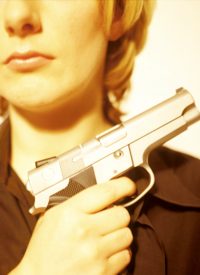
CNS News reports, “H.R. 2613, the Citizens Protection Act of 2011, would repeal the Gun-Free School Zones Act of 1990 and remove all federally created criminal safety zones.”
The Gun-Free School Zones Act was first enacted as section 1702 of the Crime Control Act of 1990. The text of the act reads, “It shall be unlawful for any individual knowingly to possess a firearm that has moved in or that otherwise affects interstate or foreign commerce at a place that the individual knows, or has reasonable cause to believe, is a school zone.”
Paul’s bill will permit individuals, including teachers, to carry firearms onto high-school and middle-school campuses.
The Gun-Free School Zones Act faced adamant opposition from Second Amendment advocacy groups like Gun Owners of America, which has indicated its support for Paul’s legislation.
According to a news release from Gun Owners of America, the Gun-Free School Zones Act protects criminals. The release points to attacks at Columbine, Virginia Tech, and Fort Hood, all of which are “government facilities where the private possession of firearms was prohibited.”
The release continues, “It’s time to say NO to criminal safe zones. And a great place to start is the blatantly unconstitutional Gun-free School Zones Act.”
A number of pro-gun groups argued that the shootings at Columbine High School and Platte Canyon, two high schools in Colorado, necessitated the repeal of the School Zones Act so that campuses would be safer.
Alan Gottlieb, chairman of the Citizens Committee for the Right to Keep and Bear Arms, said that despite the intentions of the School Zones Act, it ultimately created “target-rich, no-risk environments for monsters who have no fear of encountering an armed teacher or administrator, or a legally armed private citizen who might happen to be in the building.”
"This sort of thing didn’t happen before the advent of gun-free school zone laws," Gottlieb said. "You never saw such an outrage in the days when high schools typically had rifle teams, and — particularly in the West — where it was common in the fall to find both teachers and students with hunting rifles or shotguns locked in their cars.”
Gun control groups, on the other hand, believe Paul’s legislation to be dangerous and extreme.
Ladd Everitt, communications director for the Coalition to Stop Gun Violence, said of the bill, “It’s a horrific piece of legislation that will present a direct threat to public safety. ‘Gun-free zones,’ despite the gun lobby’s propaganda, are far and away the safest places in our country.”
Everitt asserts that the bill will likely garner support only from extremist groups:
Rep. Paul’s legislation is the latest in a series of extreme pieces of legislation to come from the National Rifle Association. Bills like this have no public support whatsoever and seek to elevate the interests of the gun industry and a tiny minority of gun owners over the wishes, well-being, and safety of American families in communities across the United States.
But Gun Owners of America points out that the federal government’s efforts have unintended consequences:
No one — including politicians, the police, or the individual citizen — can predict where the next deranged serial killer will attack. And yet politicians continue to create “criminal safe zones” such as schools, churches, parks, restaurants that serve alcohol, etc., where the law-abiding are disarmed.
The Citizens Committee for the Right to Keep and Bear Arms (CCRKBA) said gun-free school zones have “disarmed the wrong people and left our schools, and the children inside, vulnerable to this kind of atrocity.”
The most recent example may be the developing story at Virginia Tech, where students are on lockdown after three students attending a summer camp spotted what they believed to be a gunman on campus near the student dining facility. Some fear it may result in a repeat of the tragic 2007 shooting rampage that left 33 people dead.
If passed, Paul’s legislation could allow students and teachers to be armed and prepared in incidents such as these.
For now, Paul’s legislation has been referred to the House Judiciary Committee.




